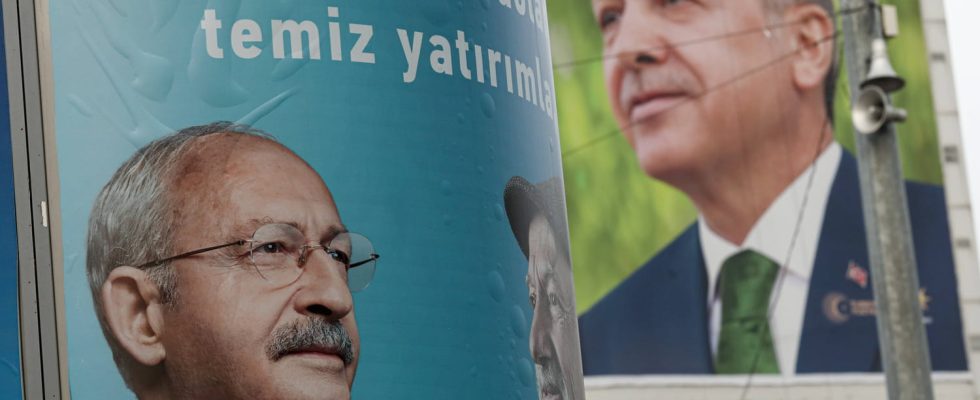This Sunday, May 14, the presidential election will take place on the same day as the legislative elections in Turkey. Recep Tayyip Erdogan, the president, is neck and neck in the polls with Kemal Kiliçdaroglu. Here’s what you need to know.
Political upheaval to come in Türkiye? In recent weeks, thehe country is now only turned towards one date: that of Sunday May 14, 2023, the day of the general elections, namely the presidential election and the legislative elections. For the first time in 20 years, Recep Tayyip Erdogan, outgoing president, is threatened by the ballot box. His rival, Kemal Kiliçdaroglu, relies on the support of a coalition of six parties including the party of Atatürk, the founder of Turkey.
The current head of state has rarely been so abused in his country, apart from an aborted coup attempt in July 2016. The major earthquake that devastated Turkey in February highlighted the country’s economic fragility , coupled with critiques of the power management of the natural disaster. Erdogan is therefore close to the hot seat, but the polls point to very small differences between the two favorites.
When are the elections held in Türkiye?
Turks are invited to vote twice on the same day. Sunday, May 14, they will elect their deputies as well as the president if a candidate obtains an absolute majority. The presidential ballot is the same as in France: uninominal majority in two rounds and the president is elected for a five-year term. Legislative elections use the proportional system. The deputies are 600 to be elected for six years. A party must obtain 7% of the vote to obtain a seat.
If no candidate obtains an absolute majority in the first round, a second ballot between the first two candidates will be held on May 28 to elect the president.
Which candidate is the favorite in the polls?
The scores of the polling institutes are very tight. But according to Politico, Kemal Kiliçdaroglu is announced as the winner of the first round with 50% of the vote against 46% for Recep Tayyip Erdogan. In the event of a duel in the second round, Kiliçdaroglu would win with 51% of the votes. Given the small differences, it is therefore very difficult to successfully predict the winner of the presidential election. Trends could also change between the two rounds.
What are the promises of the candidates?
Recep Tayyip Erdogan:
Erdogan wants to keep his current economic line. He is firmly opposed to basic economic theories: he persists in lowering interest rates despite galloping inflation for more than two years. The Turkish lira has also lost nearly 80% of its value in five years against the dollar. Internationally, Edrogan wants Ankara to maintain a strong link with Russia while the opposition wants to move closer to the European Union.
Kemal Kilicdaroglu:
The National Alliance, the six parties led by Kemal Kiliçdaroglu, wishes to abandon the presidential regime put in place in 2018. This results in the return of a parliamentary system headed by a Prime Minister elected by Parliament. But for that, it is necessary to gather 3/5th of the votes of the deputies to start a constitutional revision. The coalition wants it to return to a strict separation of powers in the country.
Kiliçdaroglu has promised to release many political prisoners if he comes to power. He also wants to improve freedom of expression and that of the press while Turkey is classified in a “very serious situation” according to Reporters Without Borders. On the other hand, his alliance has not positioned itself on the Kurds, a very critical subject in Turkey. It intends to be able to send back to Syria the more than three million Syrian refugees currently living in Turkey.
Turkey’s economic situation
According The worldthe Turkish lira is in free fall: -28% against the dollar in 2022 and -44% in 2021. If inflation is the subject of much discussion in France, the Turks have suffered a rise of 108.7% in one year in a countries where more than half of employees earn less than 300 euros per month.
But Turkey is a paradox: it is one of the few countries to maintain positive growth in 2020. The growth rate in 2022 is 7.6% against 0.5% in France. At the same time, unemployment has been falling for 2 years. The economic context is therefore a real headache to decipher.
Haluk Levent, professor of economics at Istanbul University, deciphers the situation: “The government has chosen a populist and ultra-liberal economic policy, solely oriented towards production and construction. It is very beneficial to small traders and entrepreneurs, its electoral pool, and to the banks.” He is very pessimistic about the future of his country: “the system put in place ends up inflating an extremely dangerous bubble, built on private debt, which it is hard to imagine not seeing the implosion one day”.
